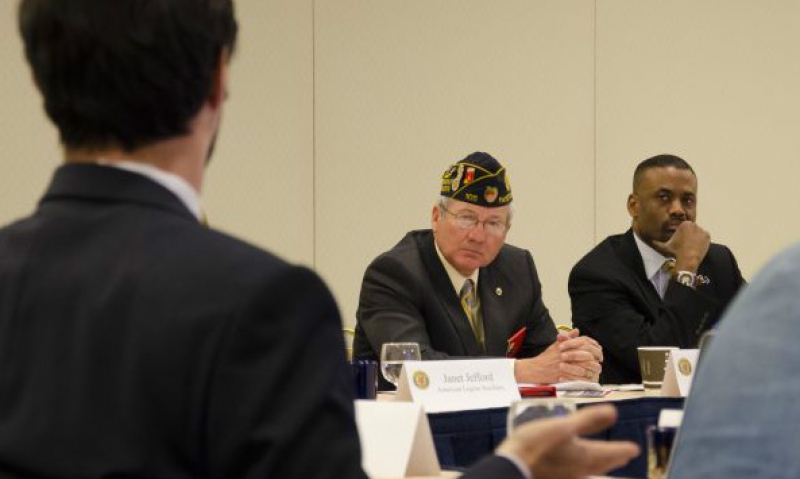
Despite current and forecast fiscal challenges, ending homelessness among veterans is still an achievable goal, said Legion roundtable participants.
On Feb. 22, The American Legion's annual Washington Conference featured a roundtable that focused on the fight to end homelessness among veterans, despite looming fiscal challenges. The homeless veterans roundtable brought together representatives from more than a dozen state and federal organizations.
Charles Selby, program analyst for the Department of Veterans’ Affairs (VA) Homeless Veterans Initiative Office, alluded to the mysteries of the still undisclosed federal budget for the coming fiscal year. Linda Charest, base realignment and closure coordinator at the U.S. Department of Housing and Urban Development (HUD), spoke of the negative impact of sequestration, the collection of massive government spending cuts preventable only by congressional action by March 1. Sequestration was also talked of by John Driscoll, president and CEO of the National Coalition for Homeless Veterans (NCHV). Driscoll spoke on behalf of the U.S. Department of Labor (DoL) in the absence of their originally scheduled representative.
Geoff Millard, special projects manager for Friendship Place, said besides slowing or stagnating funding tagged for fighting homelessness at DoL and HUD, sequestration will impede progress against homelessness in another way. Millard pointed to the many capital area veterans who are government workers, some of whom, he said, are almost sure to be laid off in the coming months and years. It is possible, Millard intimated, that some of those newly unemployed federal workers will, in time, become homeless.
The discussion was not all doom and gloom, however. Linda Charest, a Marine Corps veteran, offered an overheard rallying cry. “If homelessness is to be ended, it will end with veterans first,” she said, signaling the concerted efforts public and private forces to solve the problem. And those gathered at the Legion roundtable agreed that meeting VA Secretary Eric Shinseki’s stated goal of ending homelessness among veterans by 2015 is achievable, especially as innovative nonprofit organizations, charities, faith-based groups, veterans’ service organizations and other “non-VA” advocates take up the slack.
For example, Jessica Venegas, director of strategic partnerships for Community Solutions (CS), shared a video outlining the success of CS’s “100,000 Homes” initiative nationwide. It is based on the premise that providing a stable environment (i.e., permanent housing) is the first step to reintegrating a homeless person or family into the mainstream community. Traditionally, the successful completion of counseling, including treatment for mental health and/or substance abuse issues if needed, has been a prerequisite to a homeless person’s “earning” permanent living quarters. CS and other advocate groups claim, with supportive data, that the “housing first” model works better.
Jordan Press of the Corporation for Supportive Housing (CSH) told of his organization’s data-driven efforts to mitigate homelessness and the sharing of their documented observations with state, local and federal government agencies. CSH favors placing homeless persons in homes with in-house counseling and recovery aids.
Matt Gornick, NCHV policy director, talked of his group’s well recognized lobbying efforts, including the advancement of such ideas as automatically enrolling all combat and combat support veterans into VA health care with an “opt-out” clause. This, argues NCHV, would help assure that veterans at risk for homelessness, such as those in need of mental health care, get the aid they need and deserve.
A homeless Vietnam veteran and out-of-work portrait photographer, Duke Dunn, joined the discussion to tell his “street level” story and promote grassroots, veteran-driven efforts to help his fellows.
The roundtable was chaired by American Legion Economic Commission Chairman Dale Barnett. He was accompanied by Economic Division Deputy Director Mark Walker and the Legion Auxiliary’s Sharon Conatser, wife of Past National Commander Marty Conatser.
- Washington Conference

